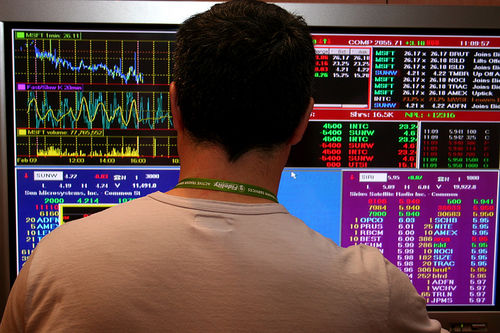Yahoo Inc. ($YHOO) has settled a dispute tarnishing a key investment in China, but the truce didn't bring much peace of mind to the embattled Internet company's disillusioned shareholders.
The complex agreement announced Friday revolves around the spinoff of an online payment service formerly owned by China's Alibaba Group, an emerging Internet powerhouse partially owned by Yahoo.Alibaba spun off the payment service, Alipay, earlier this year in a move that Yahoo shareholders didn't learn about until it was disclosed in a May 10 regulatory filing in the U.S. Yahoo's shares have lost a quarter of their value since that bombshell, reflecting investor concerns that the spinoff had diminished the value of Yahoo's 43 percent stake in Alibaba.
The settlement will require Alipay to share nearly half its profits with Alibaba. It will culminate in Alipay writing a check of $2 billion to $6 billion to Alibaba if it becomes successful enough to pursue an initial public offering of stock within the next decade. A big chunk of that money eventually could flow to Yahoo and Alibaba's other major shareholder, Japan's Softbank Corp., which also signed off on the Alipay agreement.
The terms confirmed what investors had suspected all along: Yahoo won't make as much money off of its Alibaba investment as it would have if Alipay hadn't been spun off into a separate company controlled by a group led by Alibaba CEO Jack Ma.
Instead of owning all of Alipay, Alibaba now owns a 37.5 percent stake in the service. Alibaba's potential windfall from an Alipay IPO has now been capped at $6 billion, a ceiling that might look low if Alipay can realize its ambition of becoming the China's equivalent of PayPal, which has steadily risen in value since eBay Inc. bought it for $1.5 billion in 2002.
The chief financial officers of Yahoo and Alibaba did their best to sell the Alipay settlement as good deal for all parties involved, but Wall Street didn't appear to be buying the rationale.
After initially jumping on news of the deal, Yahoo shares slipped 40 cent, or nearly 3 percent, to close Friday at $13.10.
"Alipay agreement: better than nothing, but not that great," J.P Morgan analyst Doug Anmuth wrote in a Friday note that summed up the market's sentiment.
The sour reaction keeps the pressure on Yahoo CEO Carol Bartz, whose inability to turn around the company or boost its stock after two and half years on the job has spurred talk on Wall Street that she might be replaced before her contract expires in January 2013. Yahoo has consistently indicated that Bartz has the support of the company's board, which hired her despite her lack of Internet experience.
Bartz, 62, also has had a rocky relationship with Alibaba's Ma, another source of worry for Yahoo shareholders. That's because Alibaba has emerged as a prized asset while Yahoo's own revenue has been falling during Bartz's tenure. Anmuth estimates Yahoo's stake in privately held Alibaba is worth about $4.76 billion, accounting for more than one-third of Yahoo's current market value of $17 billion. Yahoo's value has shed $7 billion since the news of the Alipay spinoff.
Neither Bartz nor Ma participated in Friday's conference call, raising questions about whether the tensions between the two executives are so bad that they can't even be diplomatic toward each other in a public forum.
In prepared statements, both Bartz and Ma hailed as positive developments for their companies.
The conference call with analysts was handled by Yahoo CFO Tim Morse and Alibaba CFO Joseph Tsai, who joined with Ma to form the company that now owns Alipay. Ma and Tsai pledged 50 million shares of Alibaba stock to back a $500 million promissory note to cover part of the future payments that Alipay is expected to make to its former parent company.
Tsai stressed Alipay had to be spun off to comply with Chinese laws forbidding foreign investments in an online payment service operating in the country.
If Yahoo and Softbank had still held indirect stakes in Alipay through Alibaba, the service wouldn't have been licensed in China. Given that, Tsai said, Yahoo shareholders should be happy to have a chance to share in Alipay's profits and IPO under the new arrangement that leaves Alibaba with a 37.5 percent stake in the payment service instead of full ownership.
"If you own 100 percent of a business that doesn't have a license to operate, that's 100 percent of zero," Tsai said.
Alipay so far has primarily processed payments on Taobao, a rapidly growing electronic commerce site owned by Alibaba. That "preferential" relationship has called for Taobao to pay Alipay just enough to cover its costs. Those terms will remain intact under the new agreement. That means if Alipay hopes to become a thriving business on its own, it will have to become a major payment provider on other websites. Tsai said Alipay so far brings in just $60 million in annual revenue from payment processing on sites other than Taobao.
"It's really too early to think of a liquidity event for Alipay," Tsai said. "But we believe given the size of the market in China ... Alipay could have potential value."
If Alipay remains privately held, the agreement allows Yahoo and Softbank to demand Alipay to go public or be put up for sale in 2021 if the payment service is worth at least $1 billion at that time.

No comments:
Post a Comment